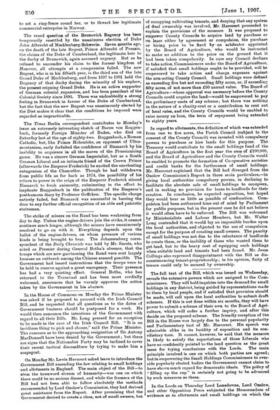In regard to allotments, the definition of which was extended
from one to five acres, the Parish Connell (subject to the consent of the County Council) was invested with compulsoiy powers to purchase or hire lands for this purpose. The Treasury would contribute to the small holdings fund of the Board of Agriculture in the first year the Burn of £100,000, and the Board of Agriculture and the County Councils would be enabled to promote the formation of Co-operative eocieties and credit banks for the furtherance of small holdings. Mr. Harcourt explained that the Bill had diverged from the Onslow Commission's Report in three main particulars,—in giving local authorities compulsory powers, in declining to facilitate the absolute sale of small holdings to occupiers, and in making no provision for loans to landlords for their creation. In conclusion, he expected opposition, but hoped they would hear as little as possible of confiscation. Com- pulsion had been authorised time out of mind by Parliament for public purposes, but in the present case he did not believe it would often have to be enforced. The Bill was welcomed by Ministerialists and Labour Members, but Mr. Walter Long contended that it would lay an impossible burden upon the local authorities, and objected to the use of compulsion except for the purpose of creating small owners. The paucity of small holdings was not due to the reluctance of landlords to create them, or the inability of those who wanted them_ to get land, but to the heavy cost of equipping such holdings when suitable land and tenants had been found. Mr. Jesse Collings also expressed disappointment with the Bill as dis- countenancing tenant-proprietorship ; in his opinion, fixity of tenure could only be secured by ownership.






































 Previous page
Previous page